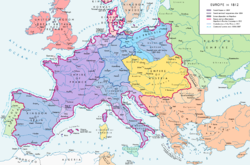Principality of Erfurt | |||||||||||||
|---|---|---|---|---|---|---|---|---|---|---|---|---|---|
| 1807–1814 | |||||||||||||
 Principality of Erfurt highlighted in yellow within the First French Empire (coloured in blues), shown with 1812 borders | |||||||||||||
 The French Empire and sphere of influence in 1812.
French Empire in 1804
French acquisitions after 1804
French satellite states
French sphere of influence
| |||||||||||||
| Status | Imperial state domain of the First French Empire | ||||||||||||
| Capital | Erfurt 50°59′0″N 11°2′0″E / 50.98333°N 11.03333°E | ||||||||||||
| Government | Principality | ||||||||||||
| Historical era | Napoleonic Wars | ||||||||||||
| 16 October 1806 | |||||||||||||
• Principality established by Napoleonic decree | 4 August 1807 | ||||||||||||
| 27 Sept – 14 Oct 1808 | |||||||||||||
| 16–19 October 1813 | |||||||||||||
• Siege of Erfurt | 28 October 1813 – 5 May 1814 | ||||||||||||
| Sept 1814 – June 1815 | |||||||||||||
| |||||||||||||
| Today part of | Germany | ||||||||||||
The Principality of Erfurt (German: Fürstentum Erfurt; French: Principauté d'Erfurt) was a small state in modern Thuringia, Germany, that existed from 1807 to 1814, comprising the modern city of Erfurt and the surrounding land. It was subordinate directly to Napoleon, the Emperor of the French, rather than being a part of the Confederation of the Rhine. After nearly 3 months of siege, the city fell to Prussian, Austrian and Russian forces. Having mainly been Prussian territory before the Napoleonic Wars, most of the lands were restored to Prussia by the Congress of Vienna.
